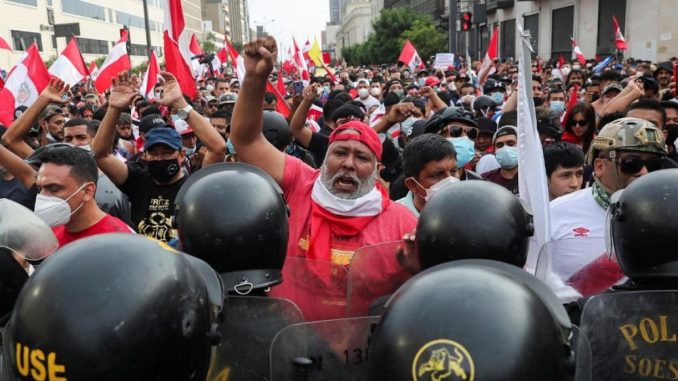
By Alternativa Socialista – Peru
The President of Peru, Pedro Castillo, established this Monday night a “State of Emergency” in the province of Lima and its neighbor Callao. In the midst of the continuity of a political crisis that once again places his presidency hanging by a thread, now after the strike of transporters and peasant sectors that left four dead due to repression and several dozens injured.
Finally, the President begins to encounter the mobilizations of poor peasants and transporters, mainly from the central and northern region of Peru, paradoxically, it is the region that voted for Castillo in the last elections. In the last hours, dissatisfaction with the Government was also expressed in Lima. These mobilizations provoked a classic response with the announcement of a curfew and state of emergency.
The demands effectively question the economic policies that Pedro Castillo’s government has implemented since he took office. In spite of the expectations created, Castillo and his economic authorities continued to serve big national and foreign businessmen, who have significantly raised the cost of goods and services, such as fuel, generating a generalized increase in the cost of living, thus affecting the poorest sectors of the population.
On the other hand, the thousands of poor peasants also question the large companies that import agricultural inputs and fertilizers, which makes the production of small and medium farmers much more expensive.
When the measures of struggle were announced, Castillo accused the promoters of the measures, “as agents of Fujimorism” and “agents of the right wing” and from then on what followed was the classic response of governments that are enemies of the people, a brutal repression that has already claimed the lives of 4 demonstrators, as we have already reported. It is obvious that the right wing will try to take advantage of the government’s discredit, but the main thing is the popular discontent in the face of the rising cost of living, the danger of shortages and now, the repression…
These repressive measures did not stop the protests that spread, for example, to the city of Huancayo where the mobilization reached the headquarters of the government party, Peru Libre and the house of its leader Vladimir Cedron.
The strong questioning forced the Government to finally negotiate with the demonstrators, put the negotiation in the hands of the ministers and announced a series of measures such as the increase of the minimum wage and simultaneously a reduction of taxes to the price-forming sectors in an attempt to stop inflation on basic necessities.
Workers’ mobilization erupts against Castillo and his government
In previous articles, we have described the quick right-wing shift of the government and the permanent search for “consensus” to avoid the vacancy requests, which caused the rapid abandonment of the electoral promises; today this shift has taken an exponential leap, with the adoption of repressive measures against popular sectors that mobilize.
We also affirm that there is no way out of the political and economic institutional crisis in our country, without discussing and questioning everything, who governs and on whose behalf, how to solve the problems of corruption typical of decadent capitalism, what economic policy is adopted or how to satisfy the priority demands.
That is why we revolutionary socialists insist, together with the millions who voted for Castillo, on the need to call for a Free and Sovereign Constituent Assembly, to throw overboard the Fujimori Constitution of 1993. Behind this objective, which we will achieve only with popular mobilization and while we continue in the streets today to satisfy the demands of the majorities by confronting repression, we will continue to insist on the urgent need to build a socialist and revolutionary alternative, unwaveringly anti-imperialist, so that once and for all, those who have never governed finally do.








